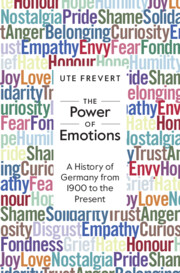Book contents
Summary
‘Dieselgate’, the Volkswagen emissions scandal, notwithstanding, German car manufacturers continue to make a profit. The blatant deception has evidently had no effect on people’s trust in the brand. Things work differently in politics, as this chapter shows. Trust in this area is a hard but also very fragile currency. After 1919, many people found it difficult to place their trust in the new Weimar state with its frequently changing representatives and governments. Instead, they blindly and unconditionally trusted Adolf Hitler: ‘The Führer commanded, we obey.’ The GDR often spoke of trust, but treated its citizens with the utmost suspicion, as the development of the Stasi informant system showed. Since democracies, too, fear the erosion of trust, they provide a legitimate framework for distrust to be expressed. Parliament is familiar with votes of confidence and votes of no confidence. Voters place their trust in people for a limited time only and can revise their decisions every four or five years. This was an option they did not have in the Third Reich and the GDR.
Keywords
- Type
- Chapter
- Information
- The Power of EmotionsA History of Germany from 1900 to the Present, pp. 340 - 358Publisher: Cambridge University PressPrint publication year: 2023

